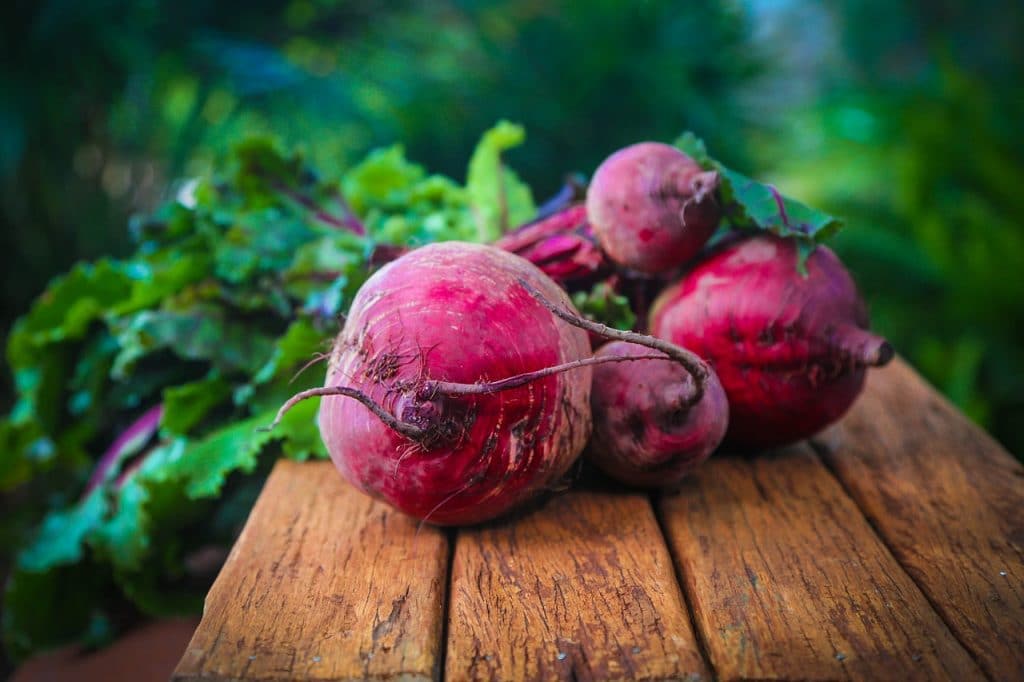
Beets and gout: beets are low in calories and fat and a great source of fiber, vitamins, minerals, and antioxidants. But can you eat them if you have gout? Read on to discover why you might want to think twice before allowing them into your gout diet.
Is Beetroot Safe in a Gout Diet?
Beets are a root vegetable somewhat similar in shape to turnips, although not in the same plant family. They are typically dark red / purple in color but can also be yellow, white, and red & white.
Beetroot may be eaten raw (in a slaw, salad or dip for example), pickled, steamed, boiled, or roasted. The green leaves can be cooked and enjoyed too. And, of course, fresh beets can be juiced.
Beets originated around the Mediterranean. They were cultivated by the ancient Egyptians, Greeks and Romans, primarily for their leaves as a food source. The roots — rather thin and fibrous in those days — were sometimes used for medicine and as a dye. They were even used as an aphrodisiac in ancient Rome!
It wasn’t until the early-to-mid 16th century that the beet roots began to be more widely cultivated for consumption. The roots by this time were probably more like parsnips. By the beginning of the 17th century they were beginning to more closely resemble the larger ball-like roots we’re familiar with today.
Russia, France, the USA, Germany, Turkey and Poland were the world’s leading producers of beets in 2018.
Known as beets in North America they are referred to as beetroot in the UK and most other English-speaking countries.
Beets Health Benefits
Beets are low in calories and fat and a great source of essential vitamins and minerals such as:
- Vitamin B6. Regulates mood, aids hemoglobin production, and helps the body use and store energy.
- Vitamin B9 (folate). Helps the body form healthy red blood cells and maintain normal tissue growth and cell function.
- Vitamin C. A powerful antioxidant that supports immune function and healthy skin and bones.
- Magnesium. Aids in the maintenance of a steady heartbeat, normal blood pressure, and healthy bones.
- Manganese. Makes and activates enzymes that help the body carry out numerous chemical processes.
- Phosphorus. Promotes strong bones and teeth, and helps release energy from food.
- Potassium. Helps control the balance of fluids in the body, regulate blood pressure, and helps the heart muscle work properly.
- Iron. Supports the immune system and helps make hemoglobin.
Beets are also a good source of fiber which helps maintain healthy bowel function and may help to lower cholesterol too.
One potential downside, though, is that beets are high in oxalate, an organic compound found in both plants and humans.
Oxalate and Kidney Stones
Too much oxalate can contribute to kidney stones, the high risk factors for which are: a family or personal history of stones; being overweight/obese; condititons like inflammatory bowel disease, renal tubular acidosis and urinary tract infections; and certain medications such as diuretics or water pills.
Those at a high risk of kidney stones are usually advised to avoid or severely limit the amount of high oxalate foods they consume.
Nevertheless, beets are a great source of fiber, magnesium, potassium, iron, folate, and antioxidants that help to support the immune system, lower blood pressure, maintain heart health, promote strong bones and teeth, and maintain bowel function.
So if you aren’t in the high risk group beets can be a healthy addition to your diet.
Even if you are at risk, you may still be able to eat them, albeit in limited amounts and as long as they are cooked to reduce the oxalate content even further. (Talk to your doctor first though.)
But, if you have gout, should you be eating beets at all?
Beets and Gout
Gout is a very painful form of inflammatory arthritis caused by abnormally high uric acid in the blood out of which monosodium urate crystals precipitate in the joints and connective tissue. These trigger an inflammatory response that produces the painful symptoms of a gout flare (attack).
Uric acid is a natural byproduct of purine metabolism, which purines exist in your body’s cells and in the cells of the food you eat. Food accounts for around 30% of your body’s total purines which is why gout patients are usually advised to avoid high purine foods like game and organ meat and limit moderately high purine foods such as beef, pork, and lamb.
Beets are low in purine in that they produce less than 100 mg of uric acid per 3.5 oz (100 g) serving.
In addition, and as with most vegetables, beets are alkaline-forming when digested which helps to maintain a more alkaline blood and urine environment that helps to lower the risk of urate crystal formation.
But unfortunately, as we saw above, beets are high in oxalate which can increase the risk of calcium-oxalate kidney stones. If these form they can impede the kidney’s ability to excrete uric acid efficiently, potentially leading to increased uric acid levels in the blood and an increased risk of a gout flare.
On balance, then, someone with gout is perhaps better off avoiding beets, especially since there are so many low-purine, low-oxalate, nutritious veggies to choose from, such as broccoli, Brussels sprouts, cabbage, cauliflower (moderately-high in purines), celery, kale, radish, squash, zucchini, and a whole lot more.
Note: You can read more about the impact of high-oxalate foods on gout here: Why Some Gout Patients Have to Avoid High-Oxalate Foods.



